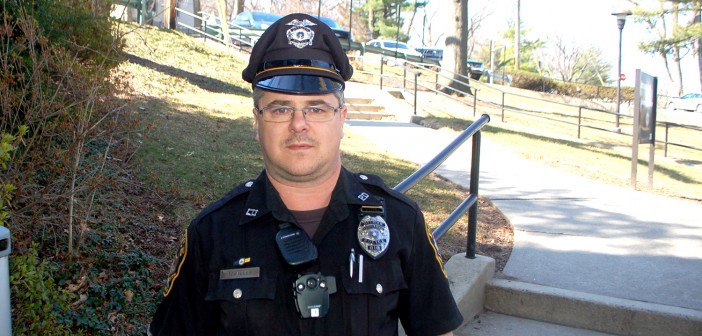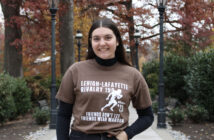The interactions between the Lehigh University Police Department and the Lehigh community are now being documented through miniature body cameras that all LUPD officers are required to wear.
According to the LUPD Police Chief Edward Shupp, these body cameras have been in place since last fall, and officers must wear and utilize the cameras any time they are dispatched to a call.
Shupp said the LUPD can evaluate the camera footage for evidentiary purposes and also as an educational tool for the police department and the Lehigh community. He said this footage helps the department improve the way in which they communicate with members of the Lehigh community.
According to a study implemented by the Rialto, California, police department and documented by a recent New York Times article, body cameras are miniaturized video cameras with microphones that can attach to a collar, a cap or to a pair of sunglasses to document, in full detail, an officer’s interactions with civilians.
The New York Times reported that the Rialto study, which began in 2012, revealed striking results. The department had an 88 percent decline in the number of complaints filed against officers compared with the 12 months before the study.
Ian Birky, the director of Lehigh counseling and psychological services, said despite these positive results, the new recording technologies may pose invasion of privacy questions and concerns.
“Most students feel ambivalent about being on camera and being recorded,” Birky said. “Although the cameras may not be preferred, the cameras will not cause heightened anxiety because the camera is not a significantly greater stressor than whatever it is that the student is being apprehended for in the first place.”
Shupp said the cameras, which have been in place since October, are not an invasion of privacy. Officers are being called to a scene or situation to assist a Lehigh student and to determine the appropriate solution to the situation. He said that if a student or Lehigh community member didn’t need assistance, the body camera would have never been required in the first place.
He also said if a student has nothing to hide, they have no reason to be offended.
Assistant Dean of Students Chris Mulvihill said the LUPD officers are well trained, they are certified and they do a good job. If the police department thinks that these body cameras are the best things to use, then they are probably the best things to use.
Shupp said the implementation of these cameras has nothing to do with the recent news of police brutality. He said the LUPD is always looking for a way to enhance safety and perform better in the community, and the cameras are simply another means of doing so.
He also said the cameras have been nothing but positive because the individuals can learn about the related incident and the LUPD can monitor certain policies and regulations.
John Smeaton, the vice provost for student affairs, said the cameras should provide clarity about the interactions between the police and the students. He said he believes it is useful to have specific information about the events rather than mere anecdotes.
The staff at the Counseling and Psychological Services Center also record most of the counseling sessions they engage in. Birky said it is difficult to get better unless the staff is able to observe what they are doing and learn from experiences.
“I think it’s better to have documented evidence of the engagements because it protects everybody involved,” Smeaton said. “It protects the student and it protects the officer by providing objective and clear documentation of that engagement, leaving less up to subjective interpretation.”






Comment policy
Comments posted to The Brown and White website are reviewed by a moderator before being approved. Incendiary speech or harassing language, including comments targeted at individuals, may be deemed unacceptable and not published. Spam and other soliciting will also be declined.
The Brown and White also reserves the right to not publish entirely anonymous comments.